冀教版八年级下Unit 5 Buying and Selling Lesson 27 Business English课件(21张ppt)
文档属性
| 名称 | 冀教版八年级下Unit 5 Buying and Selling Lesson 27 Business English课件(21张ppt) |

|
|
| 格式 | pptx | ||
| 文件大小 | 11.6MB | ||
| 资源类型 | 教案 | ||
| 版本资源 | 冀教版 | ||
| 科目 | 英语 | ||
| 更新时间 | 2022-01-03 17:50:38 | ||
图片预览

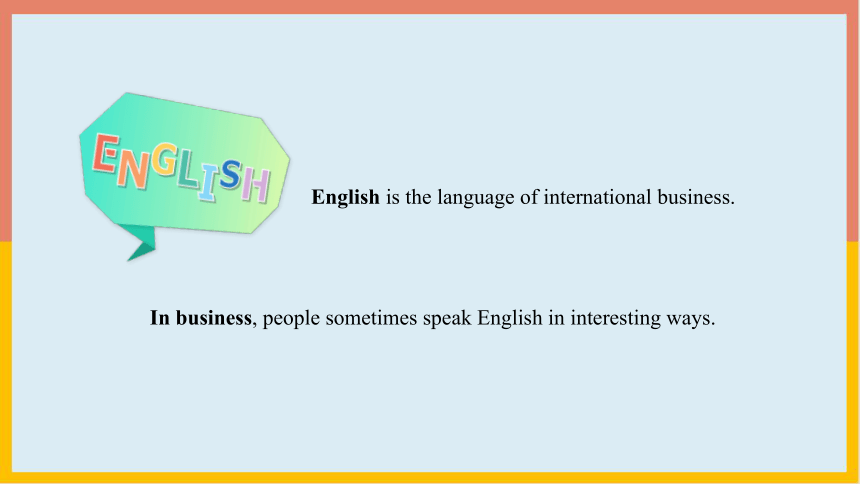
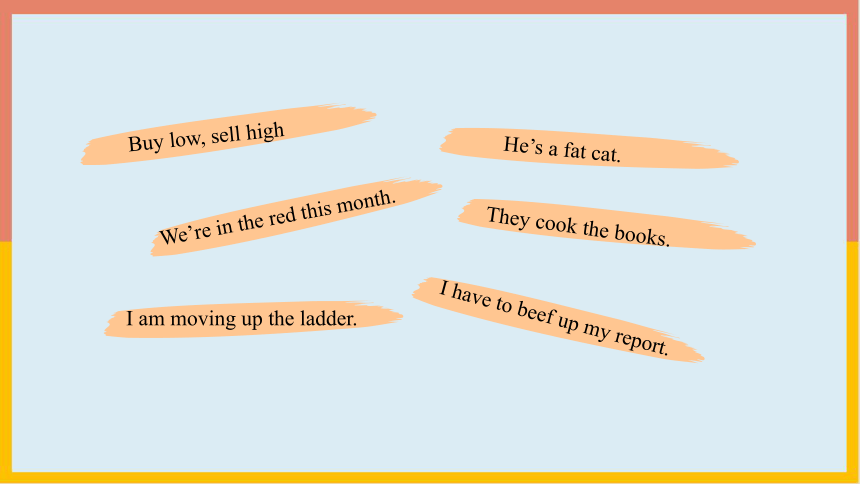
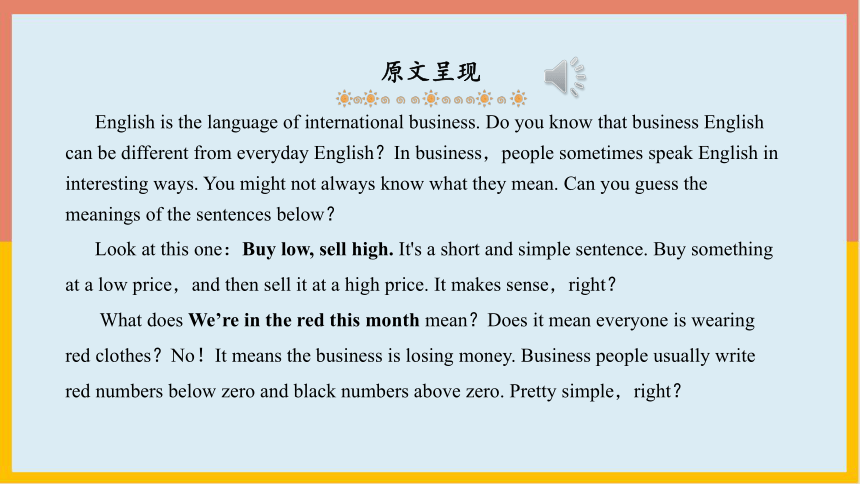
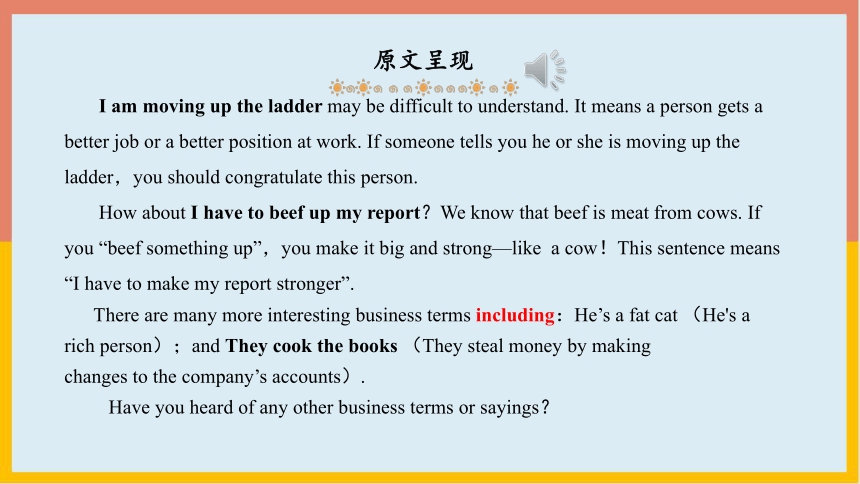

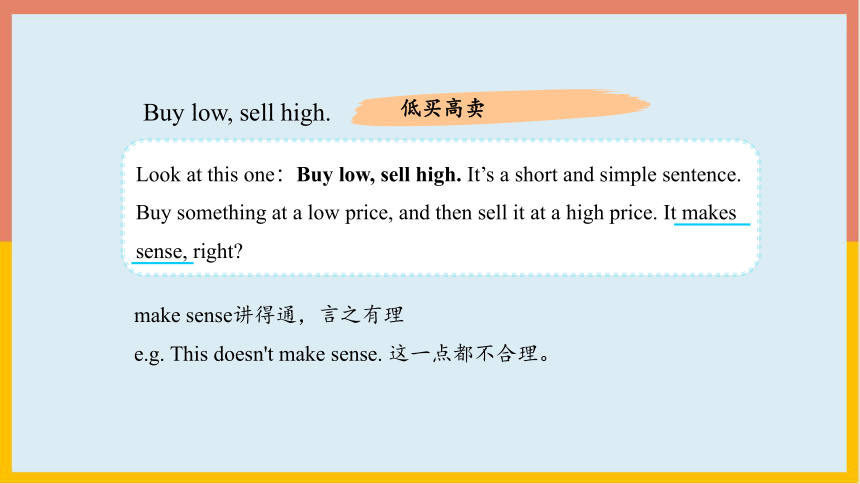
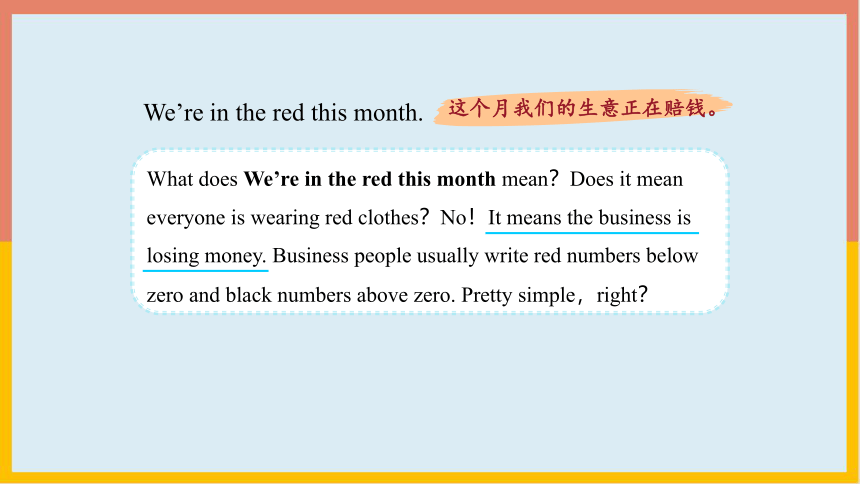
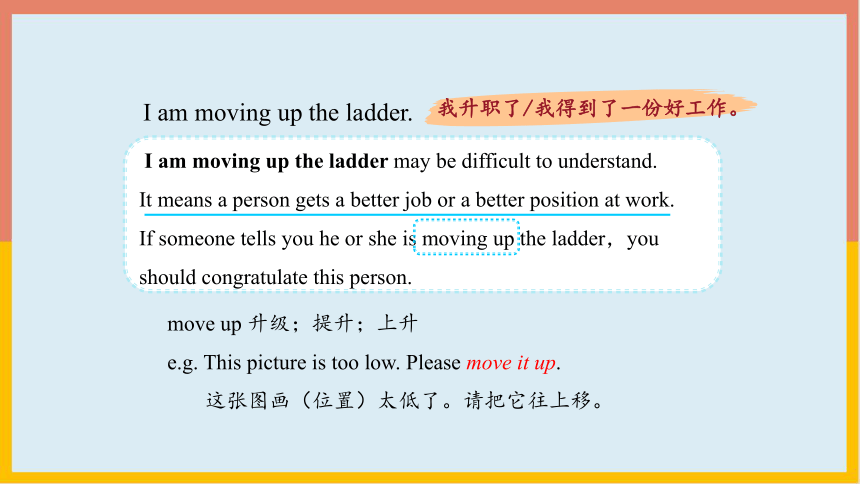
文档简介
(共21张PPT)
Lesson 27 Business English
课文讲解
Unit 5 Buying and Selling
English is the language of international business.
In business, people sometimes speak English in interesting ways.
We’re in the red this month.
I am moving up the ladder.
I have to beef up my report.
He’s a fat cat.
They cook the books.
Buy low, sell high
English is the language of international business. Do you know that business English can be different from everyday English?In business,people sometimes speak English in interesting ways. You might not always know what they mean. Can you guess the meanings of the sentences below?
Look at this one:Buy low, sell high. It's a short and simple sentence. Buy something at a low price,and then sell it at a high price. It makes sense,right?
What does We’re in the red this month mean?Does it mean everyone is wearing red clothes?No!It means the business is losing money. Business people usually write red numbers below zero and black numbers above zero. Pretty simple,right?
原文呈现
I am moving up the ladder may be difficult to understand. It means a person gets a better job or a better position at work. If someone tells you he or she is moving up the ladder,you should congratulate this person.
How about I have to beef up my report?We know that beef is meat from cows. If you “beef something up”,you make it big and strong—like a cow!This sentence means “I have to make my report stronger”.
There are many more interesting business terms including:He’s a fat cat (He's a rich person);and They cook the books (They steal money by making
changes to the company’s accounts).
Have you heard of any other business terms or sayings?
原文呈现
Buy low, sell high.
Look at this one:Buy low, sell high. It’s a short and simple sentence.
Buy something at a low price, and then sell it at a high price. It makes sense, right
低买高卖
at a low/high price以低廉/昂贵的价格
price n.价格
询问价格的句型为:What's the price of… = How much is…
Buy low, sell high.
Look at this one:Buy low, sell high. It’s a short and simple sentence.
Buy something at a low price, and then sell it at a high price. It makes sense, right
低买高卖
make sense讲得通,言之有理
e.g. This doesn't make sense. 这一点都不合理。
We’re in the red this month.
What does We’re in the red this month mean?Does it mean everyone is wearing red clothes?No!It means the business is losing money. Business people usually write red numbers below zero and black numbers above zero. Pretty simple,right?
这个月我们的生意正在赔钱。
I am moving up the ladder.
I am moving up the ladder may be difficult to understand.
It means a person gets a better job or a better position at work.
If someone tells you he or she is moving up the ladder,you should congratulate this person.
我升职了/我得到了一份好工作。
move up 升级;提升;上升
e.g. This picture is too low. Please move it up.
这张图画(位置)太低了。请把它往上移。
I am moving up the ladder.
I am moving up the ladder may be difficult to understand.
It means a person gets a better job or a better position at work.
If someone tells you he or she is moving up the ladder,you should congratulate this person.
我升职了/我得到了一份好工作。
congratulate
祝贺
congratulate sb. 祝贺某人
congratulate sb. on sth. 因某事而祝贺某人
e.g. Let’s congratulate your teacher.
e.g. We congratulated him on his success.
I am moving up the ladder.
I am moving up the ladder may be difficult to understand.
It means a person gets a better job or a better position at work.
If someone tells you he or she is moving up the ladder,you should congratulate this person.
我升职了/我得到了一份好工作。
congratulate 祝贺
congratulation祝贺
名词
I have to beef up my report.
How about I have to beef up my report?We know that beef is meat from cows. If you “beef something up”,you make it big and strong—like a cow!This sentence means “I have to make my report stronger”.
我需要补充我的报告。
He’s a fat cat.
There are many more interesting business terms including:He’s a fat cat (He's a rich person);
他是一位富人。
including prep. 包括
include v .包括;包含
include 指在一个整体中包括了其中一部分内容或项目等。
e.g. Your duties include putting the children to bed.
They cook the books.
They cook the books (They steal money by making
changes to the company’s accounts).
他们通过修改公司账目来偷钱。
Do you know that business English can be different from everyday English?
1
你知道商务英语可以不同于日常英语吗
be different from与……不同
e.g. My book is different from his.
My book isn’t the same as his.
different
e.g. There are five differences in the picture. Can you see them
反义短语
the same as... 与……相同
名词
difference
Do you know that business English can be different from everyday English?
1
你知道商务英语可以不同于日常英语吗
everyday adj.
每天的;日常的
everyday English 日常英语
everyday life 日常生活
后面可以直接跟名词,只作定语
拓展
每天;天天;副词词组,作状语,通常位于句首或句末,用来修饰整个句子。
every day
e.g. I go to school every day. 我每天上学。
I read everyday English every day.我每天读日常英语。
You might not always know what they mean.
2
你可能并不总是知道它们的意思。
mean v.意思是
mean
打算;意欲;意味着
mean to do sth. 打算做某事
e.g. I mean to go with you. 我打算和你一起去。
mean doing sth. 意味着做某事
e.g. This new rule will mean working overtime.
这一新规定意味着加班。
Have you heard of any other business terms or sayings?
3
你还听过其他商业术语或谚语吗
hear of 听说
e.g. We’re sorry to hear of your father’s death.
我们获悉令尊去世,非常难过。
Unit 5-Lesson 27课后作业(微课配套)
Bye-bye
Lesson 27 Business English
课文讲解
Unit 5 Buying and Selling
English is the language of international business.
In business, people sometimes speak English in interesting ways.
We’re in the red this month.
I am moving up the ladder.
I have to beef up my report.
He’s a fat cat.
They cook the books.
Buy low, sell high
English is the language of international business. Do you know that business English can be different from everyday English?In business,people sometimes speak English in interesting ways. You might not always know what they mean. Can you guess the meanings of the sentences below?
Look at this one:Buy low, sell high. It's a short and simple sentence. Buy something at a low price,and then sell it at a high price. It makes sense,right?
What does We’re in the red this month mean?Does it mean everyone is wearing red clothes?No!It means the business is losing money. Business people usually write red numbers below zero and black numbers above zero. Pretty simple,right?
原文呈现
I am moving up the ladder may be difficult to understand. It means a person gets a better job or a better position at work. If someone tells you he or she is moving up the ladder,you should congratulate this person.
How about I have to beef up my report?We know that beef is meat from cows. If you “beef something up”,you make it big and strong—like a cow!This sentence means “I have to make my report stronger”.
There are many more interesting business terms including:He’s a fat cat (He's a rich person);and They cook the books (They steal money by making
changes to the company’s accounts).
Have you heard of any other business terms or sayings?
原文呈现
Buy low, sell high.
Look at this one:Buy low, sell high. It’s a short and simple sentence.
Buy something at a low price, and then sell it at a high price. It makes sense, right
低买高卖
at a low/high price以低廉/昂贵的价格
price n.价格
询问价格的句型为:What's the price of… = How much is…
Buy low, sell high.
Look at this one:Buy low, sell high. It’s a short and simple sentence.
Buy something at a low price, and then sell it at a high price. It makes sense, right
低买高卖
make sense讲得通,言之有理
e.g. This doesn't make sense. 这一点都不合理。
We’re in the red this month.
What does We’re in the red this month mean?Does it mean everyone is wearing red clothes?No!It means the business is losing money. Business people usually write red numbers below zero and black numbers above zero. Pretty simple,right?
这个月我们的生意正在赔钱。
I am moving up the ladder.
I am moving up the ladder may be difficult to understand.
It means a person gets a better job or a better position at work.
If someone tells you he or she is moving up the ladder,you should congratulate this person.
我升职了/我得到了一份好工作。
move up 升级;提升;上升
e.g. This picture is too low. Please move it up.
这张图画(位置)太低了。请把它往上移。
I am moving up the ladder.
I am moving up the ladder may be difficult to understand.
It means a person gets a better job or a better position at work.
If someone tells you he or she is moving up the ladder,you should congratulate this person.
我升职了/我得到了一份好工作。
congratulate
祝贺
congratulate sb. 祝贺某人
congratulate sb. on sth. 因某事而祝贺某人
e.g. Let’s congratulate your teacher.
e.g. We congratulated him on his success.
I am moving up the ladder.
I am moving up the ladder may be difficult to understand.
It means a person gets a better job or a better position at work.
If someone tells you he or she is moving up the ladder,you should congratulate this person.
我升职了/我得到了一份好工作。
congratulate 祝贺
congratulation祝贺
名词
I have to beef up my report.
How about I have to beef up my report?We know that beef is meat from cows. If you “beef something up”,you make it big and strong—like a cow!This sentence means “I have to make my report stronger”.
我需要补充我的报告。
He’s a fat cat.
There are many more interesting business terms including:He’s a fat cat (He's a rich person);
他是一位富人。
including prep. 包括
include v .包括;包含
include 指在一个整体中包括了其中一部分内容或项目等。
e.g. Your duties include putting the children to bed.
They cook the books.
They cook the books (They steal money by making
changes to the company’s accounts).
他们通过修改公司账目来偷钱。
Do you know that business English can be different from everyday English?
1
你知道商务英语可以不同于日常英语吗
be different from与……不同
e.g. My book is different from his.
My book isn’t the same as his.
different
e.g. There are five differences in the picture. Can you see them
反义短语
the same as... 与……相同
名词
difference
Do you know that business English can be different from everyday English?
1
你知道商务英语可以不同于日常英语吗
everyday adj.
每天的;日常的
everyday English 日常英语
everyday life 日常生活
后面可以直接跟名词,只作定语
拓展
每天;天天;副词词组,作状语,通常位于句首或句末,用来修饰整个句子。
every day
e.g. I go to school every day. 我每天上学。
I read everyday English every day.我每天读日常英语。
You might not always know what they mean.
2
你可能并不总是知道它们的意思。
mean v.意思是
mean
打算;意欲;意味着
mean to do sth. 打算做某事
e.g. I mean to go with you. 我打算和你一起去。
mean doing sth. 意味着做某事
e.g. This new rule will mean working overtime.
这一新规定意味着加班。
Have you heard of any other business terms or sayings?
3
你还听过其他商业术语或谚语吗
hear of 听说
e.g. We’re sorry to hear of your father’s death.
我们获悉令尊去世,非常难过。
Unit 5-Lesson 27课后作业(微课配套)
Bye-bye
同课章节目录
- Unit 1 Spring Is Coming
- Lesson 1 How's the weather?
- Lesson 2 It's Getting Warmer!
- Lesson 3 Sun Is Rising
- Lesson 4 The Spring City
- Lesson 5 Babysitting on a Spring Day
- Lesson 6 Stories about Spring
- Unit 2 Plant a Plant
- Lesson 7 Planting Trees
- Lesson 8 Why Are Plants Important?
- Lesson 9 Gardening with Mary
- Lesson 10 Make Your Garden Grow!
- Lesson 11 Amazing Plants
- Lesson 12 Danny's Plant
- Unit 3 Animals Are Our Friends
- Lesson 13 Danny's Big Scare
- Lesson 14 Amazing Animals
- Lesson 15 The Zoo Is Open
- Lesson 16 The Pear Escaped
- Lesson 17 Save the Tigers
- Lesson 18 Friendship Between Animals
- Unit 4 The Internet Connects Us
- Lesson 19 How Do You Use the Internet?
- Lesson 20 A Computer Helps!
- Lesson 21 Books or Computers?
- Lesson 22 Travel on the Internet
- Lesson 23 The Internet--Good or Bad?
- Lesson 24 An E-mail to Grandpa
- Unit 5 Buying and Selling
- Lesson 25 Raising Money
- Lesson 26 Cookies, Please!
- Lesson 27 Business English
- Lesson 28 Ms. Liu's Great Idea
- Lesson 29 How to Push a Product
- Lesson 30 A Cookie Sale
- Unit 6 Be a Champion!
- Lesson 31 Don't Fall, Danny
- Lesson 32 My Favourite Record
- Lesson 33 2800 Years of Sports
- Lesson 34 Modern Olympics
- Lesson 35 The Dream Team
- Lesson 36 Classroom Olympics
- Unit 7 Know Our World
- Lesson 37 Let's Learn Geography!
- Lesson 38 The World Is a Big Place
- Lesson 39 Ring Up or Call?
- Lesson 40 Body Language
- Lesson 41 A Class of the World
- Lesson 42 North America
- Unit 8 Save Our World
- Lesson 43 Let's Clean Up!
- Lesson 44 Environment Clubs
- Lesson 45 Let's Sort Garbage!
- Lesson 46 Protect Our Environment
- Lesson 47 Connected to Nature
- Lesson 48 Garbage Is Interesting!
